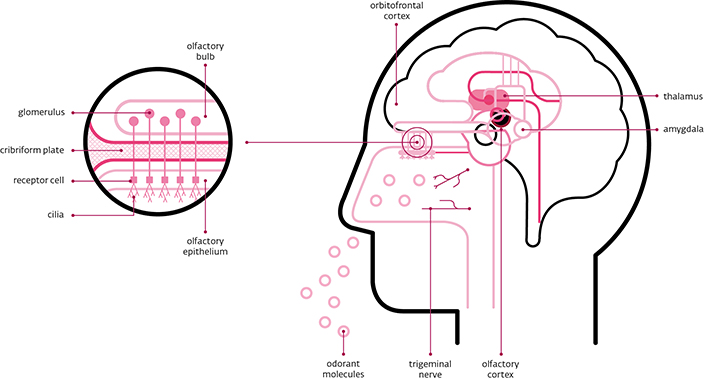Why can the sense of smell help restore memory?
Why, once you smell a flower, even a perfume, the taste of your mother's cooking, or the smell of smoke coming out of the burnt forest somewhere from a distance, memories and emotions Suddenly rushing back as if you just had a journey back in time back to the time when you smelled that smell?

Smelling can help you recover your memory
The answer is that your brain has communicated to you and your sense of smell is one of your senses that is more closely associated with memory than sight, taste, touch or hearing.
Smelling is one of the five basic senses of humans and animals, with a sense of smell. Normally, the human nose has about 100 million neurons to smell and about 1,000 different genes in these olfactory receptors. Each nerve receptor only analyzes and receives certain smells. Electric signals from the olfactory receptor are transferred to the brain to identify the scent.
Humans have more than 400 receptors capable of identifying one trillion different odors. Although science has not been able to elucidate all the mysteries behind the neurological reactions of these discovered flavors, however, a significant proof has shown that aroma has a strong impact. to the ability of the brain to recall what happened in the past, even if it took place decades ago.
From the odor molecule to the mucous membrane
If you hold an aromatic object and smell it, volatile odor molecules will penetrate the nose thanks to air transport. At the nose it will disperse itself into the mucus secreted from the mucous membrane of the nose. Next, the mucus binds to the olfactory nerves to convert the information into an electrical signal, which leads to the brain through the sieve bone, into the center of the sense of smell, from which the brain receives smell.

Smelling can help restore memory
A signal transmitted along thousands of nerves is called a axon, however, they will somehow converge in the olfactory bulb on the frontal lobe of the brain - where these signals are located. be processed.
In the olfactory bulb there are glomerulus , each of which has a definite position. Every olfactory cell belonging to the same group (having the same smell) has a nerve that leads to a olfactory bulb, which has only one nerve to the brain from the bridge. Thus, when an electrical signal is received, the brain immediately recognizes what electrical signal comes from the bridge, which is what it smelled (what kind of molecule smells). In other words, the brain recognizes the smell of the olfactory bulb in the olfactory bulb that sends electrical signals to the brain.
Connection in hippocampus (hippocampus)
Once processed, the information will continue to be transmitted through different parts of the brain close to the olfactory bulb, especially the border system - which is responsible for controlling the most primitive parts in the brain like mood, memory, affection and behavior.
The hippocampus - a part shaped like a fringe seahorse, is known for its core role in creating and storing the moments we have experienced.
In fact, the hippocampus is located in the position right next to the olfactory bulb.
First, the smell will be detected and processed, the brain shoots out information for the hippocampus and other areas in the border system, linking that smell to a person, a place, a thing or an event and then, relive memories related to that smell.
Here, the scent detection process stimulates different areas of the brain to evoke old memories.

The power of smell for people with dementia
Humans' sense of smell, although not rated as excellent in the natural world, has a strong impact on human thinking and behavior. The olfactory treatment center is located on the cerebral cortex near the memory and emotions, so a familiar smell can recall ancient images or various sad and happy emotions. Research shows that great loss is hard to imagine in those who, for some reason, lose their sense of smell. Perhaps, because we initially did not appreciate the sense of smell as other senses, we really understood only when we lost our ability to enjoy the taste in life.
The sense of smell also helps people to identify dangerous toxic odors such as the smell of spoiled food, gas smell, toxic gases polluted . The smell also supports communication and social system between people and people.
Difference
What makes the sense of smell different from the other four senses is the ability to penetrate the brain in a much more direct way, not through the hypothalamus ( thalamus) - the area between the cerebral cortex ( cerebral cortex). ) and middle brain ( midbrain ).
Information collected through sight or hearing must go through the first hill. Although it is unclear how this process will affect the senses, it is obvious that seeing and hearing have little impact on deep areas of the brain compared to smelling.
The fact is that scent goes directly to the olfactory bulb to be processed without going through any other structure. This is not only the reason why strong memories can flow clearly through sniffing but also explain why the effort to describe the scents using words is extremely difficult, if not impossible.

Not always can the sense of smell help restore memory
However, studies also show that humans can identify less than half of the odors generated by the objects they come in contact with or events they experience in everyday life, unless , surely they are recalled by a certain word or image.
Somewhere in all the memories, people, events and places that we have experienced throughout our lives are linked to certain scents, stored deep in our emotions, context and memories associated with them. It's a lot more complicated than using language to describe.
You probably already know
Why do some things have no smell, such as iron bars? Simply because they didn't smell anything. The nose only recognizes the smell or in other words we smell the smell only when the object has odor molecules evaporating into the air.
- People with good spatial memory are good at sense of smell
- Strange discovery of childhood sense of smell
- People are losing their sense of smell because of pollution
- Loss of appetite reduces desire
- Interesting revelations about smell and smell
- Do not smell anything - unexpected signs of dying
- Birds use the sense of smell to detect enemies
- Memory recovery by electric shock
- Forget the smell of lovers, watch out for memory loss!
- Smell, don't close your eyes
- The mystery of the relationship between poor sense of smell and the risk of death
- Advertising aimed at the sense of smell
 'Fine laughs' - Scary and painful torture in ancient times
'Fine laughs' - Scary and painful torture in ancient times The sequence of numbers 142857 of the Egyptian pyramids is known as the strangest number in the world - Why?
The sequence of numbers 142857 of the Egyptian pyramids is known as the strangest number in the world - Why? Miracle behind the world's largest stone Buddha statue
Miracle behind the world's largest stone Buddha statue What is alum?
What is alum?